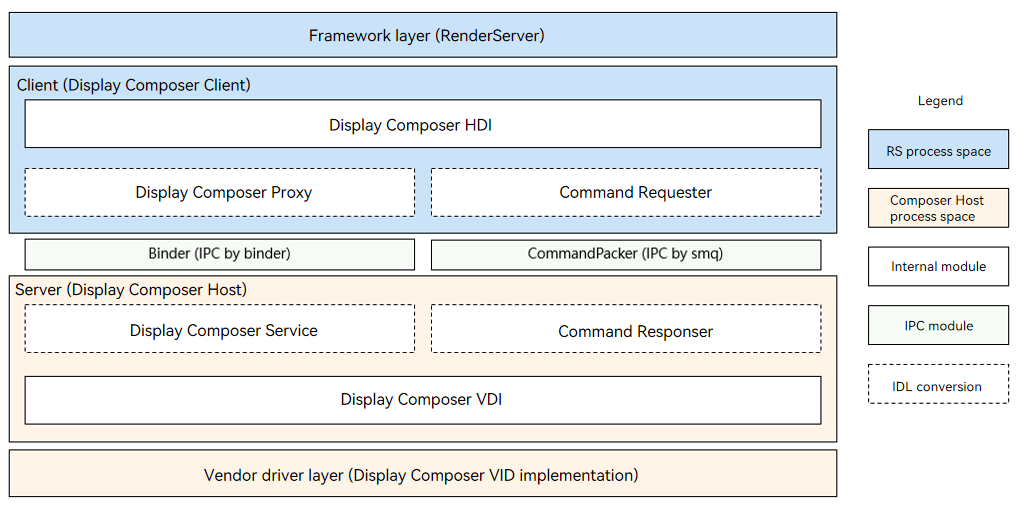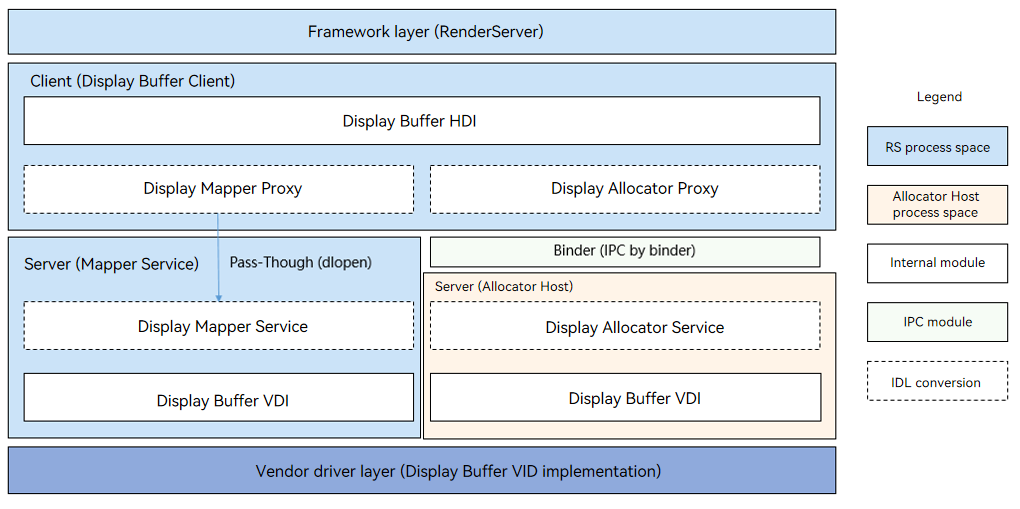Display VDI
Overview
The display vendor device interface (VDI) is provided for chip vendor devices to access to the OpenHarmony display driver framework model. The display VDI interface consists of the following:
- Composer: implements layer composition and display.
- Buffer: implements allocation and release of the surface buffer.
Composer
Figure 1 Display composer HDI architecture

The framework model consists of the following layers:
- Framework layer: interacts with the HDI implementation layer to implements composition and display of layers and manages hardware devices of the display module.
- HDI implementation layer: implements the OpenHarmony Composer HDI interface.
- Vendor driver layer: supports multi-platform adaptation by shielding the differences between underlying chips and OSs.
Buffer
Figure 2 Display buffer HDI architecture

The framework model consists of the following layers:
- Framework layer: interacts with the HDI implementation layer to implements allocation and release of graphics buffers.
- HDI implementation layer: implements the OpenHarmony buffer HDI interface.
- Vendor driver layer: supports multi-platform adaptation by shielding the differences between underlying chips and OSs.
Development Guidelines
Composer
Available APIs
You can obtain the VDI declaration file /drivers/peripheral/display/composer/hdi_service/include/idisplay_composer_vdi.h from https://gitee.com/openharmony/drivers_peripheral/tree/master/display/composer.
- idisplay_composer_vdi.h
| API | Description |
|---|---|
| int32_t RegHotPlugCallback(HotPlugCallback cb, void* data) | Registers a callback for a hot plug event. |
| int32_t GetDisplayCapability(uint32_t devId, DisplayCapability& info) | Obtains the capability set of a display device. |
| int32_t GetDisplaySupportedModes(uint32_t devId, std::vector<DisplayModeInfo>& modes) | Obtains the supported display modes of a display device. |
| int32_t GetDisplayMode(uint32_t devId, uint32_t& modeId) | Obtains the current display mode of a display device. |
| int32_t SetDisplayMode(uint32_t devId, uint32_t modeId) | Sets the display mode of a display device. |
| int32_t GetDisplayPowerStatus(uint32_t devId, DispPowerStatus& status) | Obtains the power status of a display device. |
| int32_t SetDisplayPowerStatus(uint32_t devId, DispPowerStatus status) | Sets the power status of a display device. |
| int32_t GetDisplayBacklight(uint32_t devId, uint32_t& level) | Obtains the backlight value of a display device. |
| int32_t SetDisplayBacklight(uint32_t devId, uint32_t level) | Sets the backlight value for a display device. |
| int32_t GetDisplayProperty(uint32_t devId, uint32_t id, uint64_t& value) | Obtains a property of a display device. |
| int32_t GetDisplayCompChange(uint32_t devId, std::vector<uint32_t>& layers, std::vector<int32_t>& types) | Obtains the layer whose composition type is changed for a display device. |
| int32_t SetDisplayClientCrop(uint32_t devId, const IRect& rect) | Sets the cropping area of a display device. |
| int32_t SetDisplayClientBuffer(uint32_t devId, const BufferHandle& buffer, int32_t fence) | Sets the display buffer of the display device. |
| int32_t SetDisplayClientDamage(uint32_t devId, std::vector<IRect>& rects) | Sets the dirty region of a display device. |
| int32_t SetDisplayVsyncEnabled(uint32_t devId, bool enabled) | Enables the vertical sync signal. |
| int32_t RegDisplayVBlankCallback(uint32_t devId, VBlankCallback cb, void* data) | Registers a VBlank event callback. |
| int32_t GetDisplayReleaseFence(uint32_t devId, std::vector<uint32_t>& layers, std::vector<int32_t>& fences) | Obtains the display layer fence. |
| int32_t CreateVirtualDisplay(uint32_t width, uint32_t height, int32_t& format, uint32_t& devId) | Creates a virtual display device. |
| int32_t DestroyVirtualDisplay(uint32_t devId) | Destroys a virtual display device. |
| int32_t SetVirtualDisplayBuffer(uint32_t devId, const BufferHandle& buffer, const int32_t fence) | Sets the output buffer of a virtual display. |
| int32_t SetDisplayProperty(uint32_t devId, uint32_t id, uint64_t value) | Sets a property for a display device. |
| int32_t Commit(uint32_t devId, int32_t& fence) | Commits a composition request. |
| int32_t CreateLayer(uint32_t devId, const LayerInfo& layerInfo, uint32_t& layerId) | Creates a layer. |
| int32_t DestroyLayer(uint32_t devId, uint32_t layerId) | Destroys a layer. |
| int32_t PrepareDisplayLayers(uint32_t devId, bool& needFlushFb) | Prepares the layers to display. |
| int32_t SetLayerAlpha(uint32_t devId, uint32_t layerId, const LayerAlpha& alpha) | Sets the alpha value of a layer. |
| int32_t SetLayerRegion(uint32_t devId, uint32_t layerId, const IRect& rect) | Sets the region for a layer. |
| int32_t SetLayerCrop(uint32_t devId, uint32_t layerId, const IRect& rect) | Sets the cropping area for a layer. |
| int32_t SetLayerZorder(uint32_t devId, uint32_t layerId, uint32_t zorder) | Sets the Z-axis order for a layer. |
| int32_t SetLayerPreMulti(uint32_t devId, uint32_t layerId, bool preMul) | Sets the premultiplication for a layer. |
| int32_t SetLayerTransformMode(uint32_t devId, uint32_t layerId, TransformType type) | Sets the transform mode for a layer. |
| int32_t SetLayerDirtyRegion(uint32_t devId, uint32_t layerId, const std::vector<IRect>& rects) | Sets the dirty region of a layer. |
| int32_t SetLayerVisibleRegion(uint32_t devId, uint32_t layerId, std::vector<IRect>& rects) | Sets the visible region of a layer. |
| int32_t SetLayerBuffer(uint32_t devId, uint32_t layerId, const BufferHandle& buffer, int32_t fence) | Sets the buffer for a layer. |
| int32_t SetLayerCompositionType(uint32_t devId, uint32_t layerId, CompositionType type) | Sets the expected composition type for the client. |
| int32_t SetLayerBlendType(uint32_t devId, uint32_t layerId, BlendType type) | Sets the blend type for a layer. |
| int32_t SetLayerMaskInfo(uint32_t devId, uint32_t layerId, const MaskInfo maskInfo) | Sets the layer mask information. |
| int32_t SetLayerColor(uint32_t devId, uint32_t layerId, const LayerColor& layerColor) | Sets the color for a layer. |
How to Develop
The following walks you through on how to implement the rk3568 composer VDI.
- Implement the composer VDI APIs.
Implement the APIs defined in idisplay_composer_vdi.h.
class DisplayComposerVdiImpl : public IDisplayComposerVdi {
public:
DisplayComposerVdiImpl();
virtual ~DisplayComposerVdiImpl();
virtual int32_t RegHotPlugCallback(HotPlugCallback cb, void* data) override;
virtual int32_t GetDisplayCapability(uint32_t devId, DisplayCapability& info) override;
virtual int32_t GetDisplaySupportedModes(uint32_t devId, std::vector<DisplayModeInfo>& modes) override;
virtual int32_t GetDisplayMode(uint32_t devId, uint32_t& modeId) override;
virtual int32_t SetDisplayMode(uint32_t devId, uint32_t modeId) override;
virtual int32_t GetDisplayPowerStatus(uint32_t devId, DispPowerStatus& status) override;
virtual int32_t SetDisplayPowerStatus(uint32_t devId, DispPowerStatus status) override;
virtual int32_t GetDisplayBacklight(uint32_t devId, uint32_t& level) override;
virtual int32_t SetDisplayBacklight(uint32_t devId, uint32_t level) override;
virtual int32_t GetDisplayProperty(uint32_t devId, uint32_t id, uint64_t& value) override;
virtual int32_t GetDisplayCompChange(uint32_t devId, std::vector<uint32_t>& layers,
std::vector<int32_t>& types) override;
virtual int32_t SetDisplayClientCrop(uint32_t devId, const IRect& rect) override;
virtual int32_t SetDisplayClientBuffer(uint32_t devId, const BufferHandle& buffer, int32_t fence) override;
virtual int32_t SetDisplayClientDamage(uint32_t devId, std::vector<IRect>& rects) override;
virtual int32_t SetDisplayVsyncEnabled(uint32_t devId, bool enabled) override;
virtual int32_t RegDisplayVBlankCallback(uint32_t devId, VBlankCallback cb, void* data) override;
virtual int32_t GetDisplayReleaseFence(uint32_t devId, std::vector<uint32_t>& layers,
std::vector<int32_t>& fences) override;
virtual int32_t CreateVirtualDisplay(uint32_t width, uint32_t height, int32_t& format, uint32_t& devId) override;
virtual int32_t DestroyVirtualDisplay(uint32_t devId) override;
virtual int32_t SetVirtualDisplayBuffer(uint32_t devId, const BufferHandle& buffer, const int32_t fence) override;
virtual int32_t SetDisplayProperty(uint32_t devId, uint32_t id, uint64_t value) override;
virtual int32_t Commit(uint32_t devId, int32_t& fence) override;
virtual int32_t CreateLayer(uint32_t devId, const LayerInfo& layerInfo, uint32_t& layerId) override;
virtual int32_t DestroyLayer(uint32_t devId, uint32_t layerId) override;
virtual int32_t PrepareDisplayLayers(uint32_t devId, bool& needFlushFb) override;
virtual int32_t SetLayerAlpha(uint32_t devId, uint32_t layerId, const LayerAlpha& alpha) override;
virtual int32_t SetLayerRegion(uint32_t devId, uint32_t layerId, const IRect& rect) override;
virtual int32_t SetLayerCrop(uint32_t devId, uint32_t layerId, const IRect& rect) override;
virtual int32_t SetLayerZorder(uint32_t devId, uint32_t layerId, uint32_t zorder) override;
virtual int32_t SetLayerPreMulti(uint32_t devId, uint32_t layerId, bool preMul) override;
virtual int32_t SetLayerTransformMode(uint32_t devId, uint32_t layerId, TransformType type) override;
virtual int32_t SetLayerDirtyRegion(uint32_t devId, uint32_t layerId, const std::vector<IRect>& rects) override;
virtual int32_t SetLayerVisibleRegion(uint32_t devId, uint32_t layerId, std::vector<IRect>& rects) override;
virtual int32_t SetLayerBuffer(uint32_t devId, uint32_t layerId,
const BufferHandle& buffer, int32_t fence) override;
virtual int32_t SetLayerCompositionType(uint32_t devId, uint32_t layerId, CompositionType type) override;
virtual int32_t SetLayerBlendType(uint32_t devId, uint32_t layerId, BlendType type) override;
virtual int32_t SetLayerMaskInfo(uint32_t devId, uint32_t layerId, const MaskInfo maskInfo) override;
virtual int32_t SetLayerColor(uint32_t devId, uint32_t layerId, const LayerColor& layerColor) override;
};
using CreateComposerVdiFunc = IDisplayComposerVdi* (*)();
using DestroyComposerVdiFunc = void (*)(IDisplayComposerVdi* vdi);
extern "C" IDisplayComposerVdi* CreateComposerVdi();
extern "C" void DestroyComposerVdi(IDisplayComposerVdi* vdi);
- Build a shared library.
Build a shared library named libdisplay_composer_vdi_impl.z.so. Write the BUILD.gn file. You can obtain the BUILD.gn file of rk3568 from https://gitee.com/openharmony/device_soc_rockchip/blob/master/rk3568/hardware/display/BUILD.gn.
ohos_shared_library("libdisplay_composer_vdi_impl") {
sources = [ "src/display_device/display_composer_vdi_impl.cpp" ]
include_dirs = [
"src/display_device",
"${root_path}/drivers/peripheral/display/utils/include",
"${root_path}/drivers/interface/display/composer",
"${root_path}/drivers/peripheral/display/composer/hdi_service/include",
"${root_path}/drivers/interface/display/composer/hdifd_parcelable",
]
deps = [ ":display_composer_vendor" ]
external_deps = [
"c_utils:utils",
"drivers_interface_display:display_composer_idl_headers",
"graphic_chipsetsdk:buffer_handle",
"hilog:libhilog",
"ipc:ipc_single",
]
install_enable = true
install_images = [ chipset_base_dir ]
subsystem_name = "hdf"
part_name = "rockchip_products"
}
In the root directory of your project, run the following command to build the share library:
./build.sh -p rk3568 -T display_composer_model
Then, you can find libdisplay_composer_vdi_impl.z.so in the out/rk3568/hdf/rockchip_products directory.
Development Example
A default VDI implementation is provided for your reference. For details, see drivers/peripheral/display/composer/vdi_base at https://gitee.com/openharmony/drivers_peripheral/tree/master/display/composer/vdi_base.
Buffer
Available APIs
You can obtain the VDI declaration file /drivers/peripheral/display/buffer/hdi_service/include/idisplay_buffer_vdi.h from https://gitee.com/openharmony/drivers_peripheral/tree/master/display/buffer.
- idisplay_composer_vdi.h
| API | Description |
|---|---|
| int32_t AllocMem(const AllocInfo& info, BufferHandle*& handle) | Allocates a buffer. |
| void FreeMem(const BufferHandle& handle) | Releases a buffer. |
| void* Mmap(const BufferHandle& handle) | Maps a buffer to the memory. |
| int32_t Unmap(const BufferHandle& handle) | Unmaps a buffer. |
| int32_t FlushCache(const BufferHandle& handle) | Flushes a buffer. |
| int32_t InvalidateCache(const BufferHandle& handle) | Invalidates a buffer. |
| int32_t IsSupportedAlloc(const std::vector |
Checks whether the requested buffer can be allocated. |
| int32_t RegisterBuffer(const BufferHandle& handle) | Registers a buffer. |
| int32_t GetMetadata(const BufferHandle& handle, uint32_t key, std::vector<uint8_t>& value) | Obtains the metadata of a buffer. |
| int32_t ListMetadataKeys(const BufferHandle& handle, std::vector<uint32_t>& keys) | Lists the keys of the metadata. |
| int32_t EraseMetadataKey(const BufferHandle& handle, uint32_t key) | Erases the metadata of the specified key. |
How to Develop
The following walks you through on how to implement the rk3568 buffer VDI.
-
Implement the buffer VDI APIs.
Implement the APIs defined in idisplay_buffer_vdi.h.
class DisplayBufferVdiImpl : public IDisplayBufferVdi {
public:
DisplayBufferVdiImpl();
virtual ~DisplayBufferVdiImpl();
virtual int32_t AllocMem(const AllocInfo& info, BufferHandle*& handle) const override;
virtual void FreeMem(const BufferHandle& handle) const override;
virtual void *Mmap(const BufferHandle& handle) const override;
virtual int32_t Unmap(const BufferHandle& handle) const override;
virtual int32_t FlushCache(const BufferHandle& handle) const override;
virtual int32_t InvalidateCache(const BufferHandle& handle) const override;
virtual int32_t IsSupportedAlloc(const std::vector<VerifyAllocInfo>& infos,
std::vector<bool>& supporteds) const override;
virtual int32_t RegisterBuffer(const BufferHandle& handle) override;
virtual int32_t SetMetadata(const BufferHandle& handle, uint32_t key, const std::vector<uint8_t>& value) override;
virtual int32_t GetMetadata(const BufferHandle& handle, uint32_t key, std::vector<uint8_t>& value) override;
virtual int32_t ListMetadataKeys(const BufferHandle& handle, std::vector<uint32_t>& keys) override;
virtual int32_t EraseMetadataKey(const BufferHandle& handle, uint32_t key) override;
};
using CreateDisplayBufferVdiFunc = IDisplayBufferVdi* (*)();
using DestroyDisplayBufferVdiFunc = void (*)(IDisplayBufferVdi* vdi);
extern "C" IDisplayBufferVdi* CreateDisplayBufferVdi();
extern "C" void DestroyDisplayBufferVdi(IDisplayBufferVdi* vdi);
-
Build a shared library.
Build a shared library named libdisplay_buffer_vdi_impl.z.so. Write the BUILD.gn file. You can obtain the BUILD.gn file of rk3568 from https://gitee.com/openharmony/device_soc_rockchip/blob/master/rk3568/hardware/display/BUILD.gn.
ohos_shared_library("libdisplay_buffer_vdi_impl") {
sources = [ "src/display_gralloc/display_buffer_vdi_impl.cpp" ]
public_configs = [ ":libdisplay_buffer_vdi_impl_config" ]
include_dirs = [
"./src/display_gralloc",
"${root_path}/drivers/peripheral/base",
"${root_path}/drivers/interface/display/composer/hdifd_parcelable",
"${root_path}/drivers/interface/display/buffer",
"${root_path}/drivers/peripheral/display/utils/include",
"${root_path}/drivers/peripheral/display/buffer/hdi_service/include",
]
output_name = "libdisplay_buffer_vdi_impl"
cflags = [
"-DGRALLOC_GBM_SUPPORT",
"-Wno-macro-redefined",
]
deps = [ ":libdisplay_buffer_vendor" ]
external_deps = [
"c_utils:utils",
"drivers_interface_display:display_buffer_idl_headers",
"drivers_interface_display:display_composer_idl_headers",
"hdf_core:libhdf_utils",
"hilog:libhilog",
"ipc:ipc_single",
]
install_enable = true
install_images = [ chipset_base_dir ]
innerapi_tags = [ "passthrough" ]
subsystem_name = "hdf"
part_name = "rockchip_products"
}
In the root directory of your project, run the following command to build the share library:
./build.sh -p rk3568 -T display_buffer_model
Then, you can find libdisplay_buffer_vdi_impl.z.so in the out/rk3568/hdf/rockchip_products directory.
Development Example
A default VDI implementation is provided for your reference. For details, see drivers/peripheral/display/buffer/vdi_base at https://gitee.com/openharmony/drivers_peripheral/tree/master/display/buffer/vdi_base.